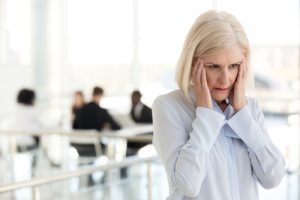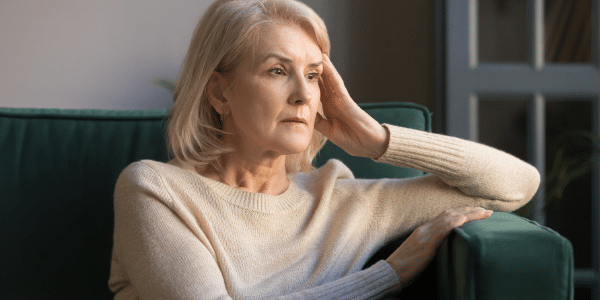Many older people suffer from social phobia, which leads to serious life restrictions. However, there are ways out of the dilemma.
What Is Social Anxiety?
Social Anxiety, also called social phobia, is an intense fear of being judged, embarrassed or rejected in a social situation. This results in self-consciousness when in social situations and a fear of looking anxious or awkward. Those with severe social phobia may suffer from physical symptoms, such as rapid heart rate, sweating, nausea or panic attacks. Approximately 15 million American adults suffer from social anxiety disorder, and it can affect nearly all aspects of a person’s life, including job choices, friendships, errands and daily routines. While it may seem that the wisdom and perspective of aging would lessen anxiety, one in five older adults suffers from anxiety. Health problems, hormonal changes, loss and medication side effects all contribute to increased social anxiety in older adults. Often, seniors are more focused on their physical health problems and tend to overlook the increased anxiety they are experiencing.
Anxiety in Older Adults
As older adults age, health problems become more prevalent. Medical problems such as heart disease, diabetes, memory problems and chronic pain can all make getting out of the house feel increasingly hard. Anxiety is also a common side effect of medications needed to manage these health problems. Many seniors have gone through major life changes, such as the death of a spouse, close friend or sibling. Maybe one’s spouse always drove, or a person always took a daily walk with a friend. These changes contribute to social anxiety and leave many seniors feeling trapped and anxious. Aging adults may also begin to worry about dying, being alone, being dependent on other people or finances. These worries can isolate seniors and cause them to retreat within themselves.
Hormonal Changes

These hormonal changes cause rising cortisol, epinephrine and norepinephrine levels and tend to peak at night, which can cause sleep problems. Cortisol is the body’s stress hormone, and epinephrine and norepinephrine are responsible for the body’s fight-or-flight response. These rising hormonal levels cause increased stress, anxiety and insomnia. Decreased levels of estrogen experienced during menopause also contribute to depression, anxiety and general moodiness. Not only are these hormones causing anxiety levels to rise, but so is fear over an aging and changing body. Fortunately, these hormonal changes will balance out with time.
Ways to Combat Social Anxiety
The first step in feeling better is to make an appointment to speak with your doctor. Discuss any medications you may be on and their side effects and whether medication, hormone therapy or traditional therapy may be right for you. Speak up for yourself and make your mental health a priority.
Diet and exercise are as important to mental health as they are to physical health. Try to eat a healthy, balanced diet and avoid processed foods when possible. Physical activity is vital in boosting mood, releasing stress and clearing the mind. A walk around the block or joining a local senior center or gym can do wonders for your state of mind.
Lastly, while scary, pushing yourself to engage in social activity is necessary. Attending church, joining a senior center or making plans with family and friends will often leave you feeling better afterward, even if you dread it beforehand.
Health problems, loss of loved ones and hormonal changes all contribute to rising social anxiety in seniors. Menopause and andropause result in physical and emotional changes that can leave older adults feeling moody, depressed and not like themselves. Some seniors also experience physical limitations and the loss of driving privileges. It is important to see a doctor who can provide a diagnosis and support and to reach out to loved ones.





